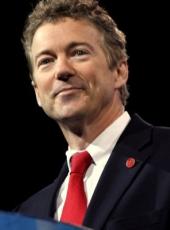Slate
By David Auerbach
June 2, 2015
Every time Kentucky Sen. Rand Paul assails mass government surveillance on the floor of the Senate, it is surprising to see who emerges to praise the erratically unorthodox Republican, from Edward Snowden to Glenn Greenwald to true-blue progressive reporter Marcy Wheeler. This support comes with caveats, of course. But the lefty applause for Paul also arrives at a moment of a distinctly lacking enthusiasm for Barack Obama and Hillary Clinton. More importantly, these plaudits align with many of the concerns of a quiet but influential contingent of liberal-leaning techies who might one day become Rand Democrats—or Democrats willing to support some other, future right-wing firebrand with lefty-compatible ideas about civil liberties—much in the way disaffected blue-collar workers became Reagan Democrats. Think of them as the New Randroids—and definitely not because they admire Ayn Rand, which they don't. Progressives and loyal Democrats would be wise not to ignore them.
Rand Paul's father, Ron Paul, has long enjoyed a libertarian following within what I call the tech laity—the vast number of tech workers who don't work for buzzy startups or dominate the tech press. This group of engineers and other research and development workers, far less white and somewhat less male than what's portrayed in the media, clusters around industry hubs in the Bay Area, Seattle, Boston, North Carolina's Research Triangle, Austin, Los Angeles, and so on. The libertarians among them, who hate the Federal Reserve and have funded the presidential ambitions of Paul pere, make up a tiny minority of the whole. What's been surprising is how hard Rand Paul has worked to broaden that small following in the hopes of reaching disaffected Republicans and Democrats. He has about as much chance of winning the nomination as Howard Dean, Paul's closest antecedent, did in 2004. But Dean came closer than most people remember, and he ended up impacting the Democratic agenda (anti-war, expanded health care, gay rights) for years. Paul hopes to do the same—and perhaps make another run at the presidency in 2020 or 2024.
One way for him to do this is with the backing of a large chunk of the tech community. Paul and others noticed the large amounts of tech money that helped fuel Ro Khanna's Democratic primary challenge to longtime Silicon Valley congressman Mike Honda last year. They rightly see the tech demographic as ready to get a lot more politically engaged—and not necessarily on just one side. Khanna lost, but he's trying again in 2016, and there is no shortage of wealthy, left-libertarian techies who could become a lot more influential should they find the right candidate. Paul wants to be that candidate.
Click here to continue reading the full article: http://www.slate.com/articles/technology/bitwise/2015/06/rand_paul_and_the_tech_vote_why_he_wants_it_and_could_just_get_it.html
Rand Paul, Rand Paul Campaign Press Release - The New Randroids Online by Gerhard Peters and John T. Woolley, The American Presidency Project https://www.presidency.ucsb.edu/node/316913

